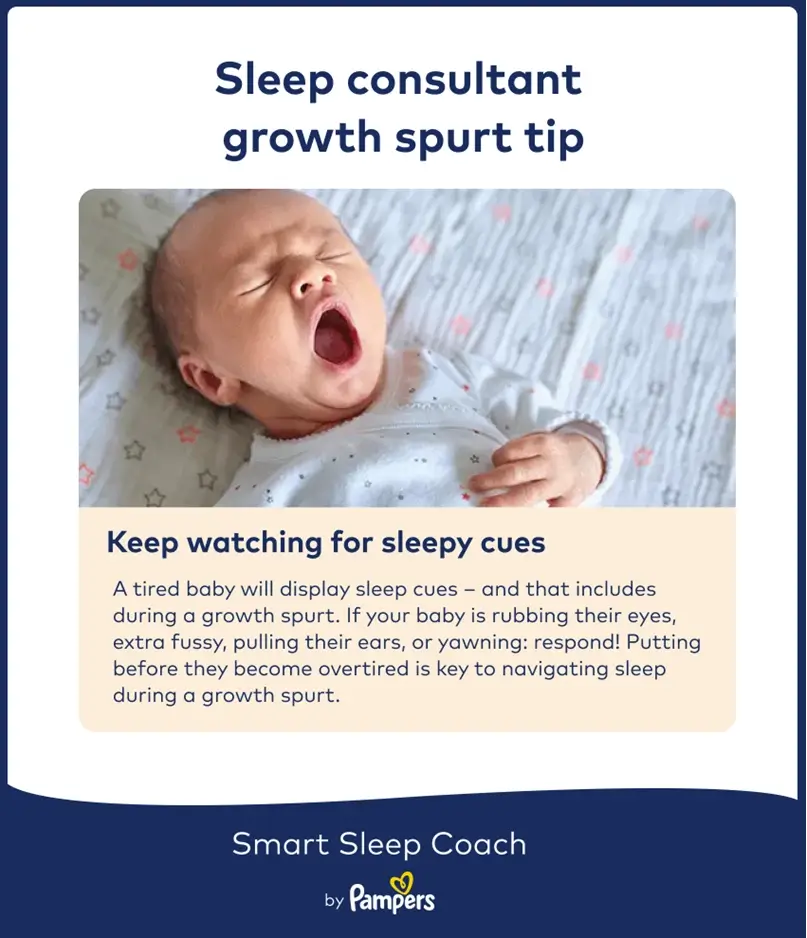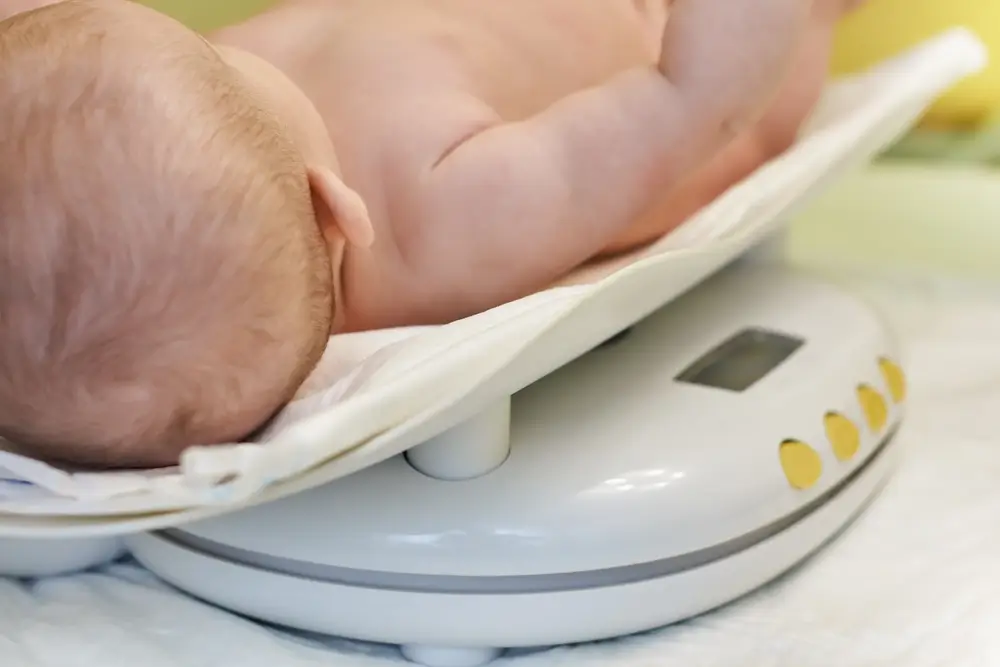Growth spurts can feel like a vague concept – especially in those early, sleep-deprived months when everything about your baby is changing so fast.
While babies are constantly developing, growing, and reaching new milestones, an infant growth spurt is something different. These are short, intense periods of rapid growth that can temporarily impact your baby’s sleep, feeding, and mood.
In this article, we’ll break down what a growth spurt is, how growth spurts differ from a sleep regression, and why understanding both can help you better support your baby through these changes (and protect your own peace of mind along the way).
What are Baby Growth Spurts?
A baby growth spurt is a period of rapid development during which your baby grows a lot over a short period of time. These physical changes can include muscle and bone growth, meaning clear increases in weight and height.
While babies are constantly growing and changing, a growth spurt happens in short, intense bursts – and it can affect everything from sleep to feeding. With most of the physical and brain development happening in the first two years of life, growth spurts are a normal and expected part of that process. When talking specifically about a newborn growth spurt, it refers to rapid growth during the 4th trimester, or the first 12 weeks of life, when higher levels of growth hormone are released.
Growth spurts often align with other physical and neurological milestones, and quality sleep plays a major role in supporting all of it. Keep in mind every baby is different and there are many factors that may affect their unique growth trajectory. Your healthcare provider will keep track of it all when you see them at your wellness visits.
When Do Babies Have Growth Spurts?
Growth spurts in babies often happen quite often. Although every baby is different, common periods for growth spurts include:
- Around 2 week growth spurt
- 6 week growth spurt
- 3 month growth spurt
- 6 month growth spurt
Often, they are timed to developmental milestones that happen around certain times, such as when your baby learns to hold their head up, roll over, or grasp objects. That means they are also timed with sleep regression (here is a timeline of sleep regression ages).
If that seems like a large amount of rapid growth, remember that by their first birthday babies grow on average ten inches and triple their birth weight!
View the World Health Organization’s growth spurt chart for newborns and children here.
What are the Signs of a Growth Spurt?
The signs of baby growth spurts aren’t just physical – here are some tell-tale signs:
- Extra Hungry: A baby on the verge of a growth spurt will become extra hungry. You may notice their hunger cues more frequently, such as crying, seeming restless, sticking out their tongue, rooting, or sucking on their hands and lips. Newborns may wake more frequently to eat or want to eat around the clock, which is called cluster feeding (we go into that more further in this article). Some babies seem to never be full!
- Fussier than Usual: Your baby may be fussier than usual, especially before a newborn growth spurt. They also may seek more comfort or closeness or be a bit clingier. It’s all part of processing big changes happening at once! You may also notice that they are starting to teethe, which can be uncomfortable.
- Changes in Sleep Patterns or Sleep Regression: During a growth spurt, some babies may sleep more – and others may start sleeping less or having disrupted sleep patterns. Since growth spurts are tied to developmental milestones, and developmental milestones are tied to sleep regression, you may notice they could be too focused on learning a new skill, such as crawling, and prefer to practice instead of sleeping. With age your baby’s sleep needs will change, too – for example, a growth spurt could happen around the time it's time to drop a nap.
- Weight or Height Changes: At your baby’s wellness visits your healthcare provider will check their height at weight. A big jump may mean they just went through a growth spurt. You can ask your provider to share more about where you baby is on the growth chart, too.
- Clothing and Diapers are Too Small: A growth spurt is often tied to clothing and diapers becoming too small. There’s nothing cuter than newborn clothes, but with the rapid growth, they don’t last too long! If you’re unsure if your baby is ready for the next size diaper, Pampers has a quiz figure out the right size diaper so you know when it’s time.
Signs of newborn growth spurt
In the first few weeks of life, newborns sleep a lot – often up to 16–18 hours a day. It’s not uncommon for babies in their first month to wake only for feeds every 2–3 hours (or even more frequently), then drift right back to sleep. That’s because growth hormone is released during sleep and more is released in the first few weeks after birth. Since babies grow a lot earlier in life, those extra naps are biologically important.
During a newborn growth spurt however, while many may sleep even more than usual, they also may wake more often to feed. If you're noticing more frequent feedings, this is what’s called cluster feeding. Cluster feeds are when your baby wants to nurse or bottle-feed in shorter intervals throughout the day. Their wake windows during this time can also be as short as 10 minutes sometimes too – just enough time to wake, eat, and fall back asleep.
While this stage can feel exhausting, it’s a normal (and healthy) sign that your baby is growing and getting what they need.
How Long Do Growth Spurts Last?
Growth spurts are usually brief, some can last up to three days, but others are even longer.
However, these spurts often coincide with other developmental changes, or with a sleep regressions, which can cause sleep disruption for longer than just three days. Sleep regressions are common, but temporary, sleep disturbances that happen often throughout the first two years of life.
What is the Impact of Growth Spurts on Sleep
There are many possible impacts that growth spurts could have on sleep, making the common question, “Do babies sleep more during growth spurts?" a little harder to answer.
For example, during newborn growth spurts, many babies sleep more overall but may also wake more often to feed.
Also, a growth spurt often coincides with a period of sleep regression – meaning a baby who was previously sleeping well will suddenly stop. This can look like waking up many times during the night, struggling to fall asleep at bedtime, or refusing naps.
When it comes to sleep regressions vs growth spurts
I’s important to know that not all sleep regressions are the result of growth spurts, and not all growth spurts will coincide with a sleep regression. But during a growth spurt it is likely that your baby’s sleep will be different in some way, whether that means trouble sleeping or a desire for more sleep than usual.
- Baby growth spurts and sleep regressions often go hand-in-hand because so much of your baby’s physical and cognitive development happens in these early years. Their brains and bodies are working overtime – which can temporarily disrupt sleep.
- While there are no painful side effects to growth spurts, some aspects of physical growth, like teething, can cause discomfort or lead to frequent night wakings.
- If your baby is in the middle of a sleep regression, they likely will prefer to practice their new learned skills in their crib instead of sleeping.
While it can be a challenging phase, it’s also a sign that important developmental milestones are underway.
Tips to Manage Sleep During Growth Spurts
Whether or not your baby is going through a sleep regression or their sleep needs are changing during a growth spurt, there are things you can do to help them get the rest that they need. Here are a few ideas:

- Stick With Your Routine: Your baby can start to recognize patterns by around 8 weeks old, so starting a bedtime routine helps them understand when it’s time to sleep. If you already have a set routine, resist temptation to throw in the towel if your baby is struggling with sleep. Once the growth spurt is over, your routine will also help your baby return to their regular sleep schedule.
- Keep the Sleep Environment Calm: Babies will fall asleep more easily in a quiet, dark room – but you can take it even further by creating a true sleep haven. Make sure your baby’s room has blackout curtains and use a noise machine (this blocks out sound and mimics the womb). Finally, pay attention to the ideal room temperature.
- Get in Lots of Daytime Stimulation: Your baby may be too young to tire themselves out at the playground, but any sort of stimulation at this age can be exhausting! Go for a walk or have them join you at the grocery store. When at home, give them room on the floor to look or move around. Expending energy during the day will help build up their sleep drive for night.
- Watch for Sleepy Cues: When your baby is tired, they’ll repeat the same kinds of sleep cues like rubbing eyes, fussiness, pulling ears, and good old-fashioned yawning. motions. Responding to them will help you put them to sleep at the optimal time before they become overtired and fight sleep.
- Care for Yourself: Disrupted sleep during a growth spurt isn’t just hard on your baby – it’s hard on you, too. It may start to feel like all you do is feed, soothe, and repeat – especially if your baby is also sleeping less. If you’re drained, know that you’re not alone. Whenever possible, lean on another caregiver to step in so can rest, shower, or simply eat a meal. Caring for yourself is not a luxury – it’s a necessary part of caring for your baby.
Final Thoughts
The first year of your baby’s life is full of phases – just when you start to feel like you’re getting into a rhythm, your baby hits a growth spurt. These shifts can feel sudden and overwhelming, but they’re a normal part of development – and understanding what’s happening can help you respond with more confidence and calm.
This time of rapid development is fleeting; as their brain develops and they start to grow at a steady rate, your routine will even out again. In the meantime, do your best to roll with the changes – and to prioritize self-care as much as you can.
Knowing what’s happening developmentally to cause your baby’s behavior can be a helpful way to get through these sometimes-jarring transitions. Take this free sleep assessment to get a personalized plan for dealing with everything baby sleep, including sleep disruptions related to a growth spurt.













